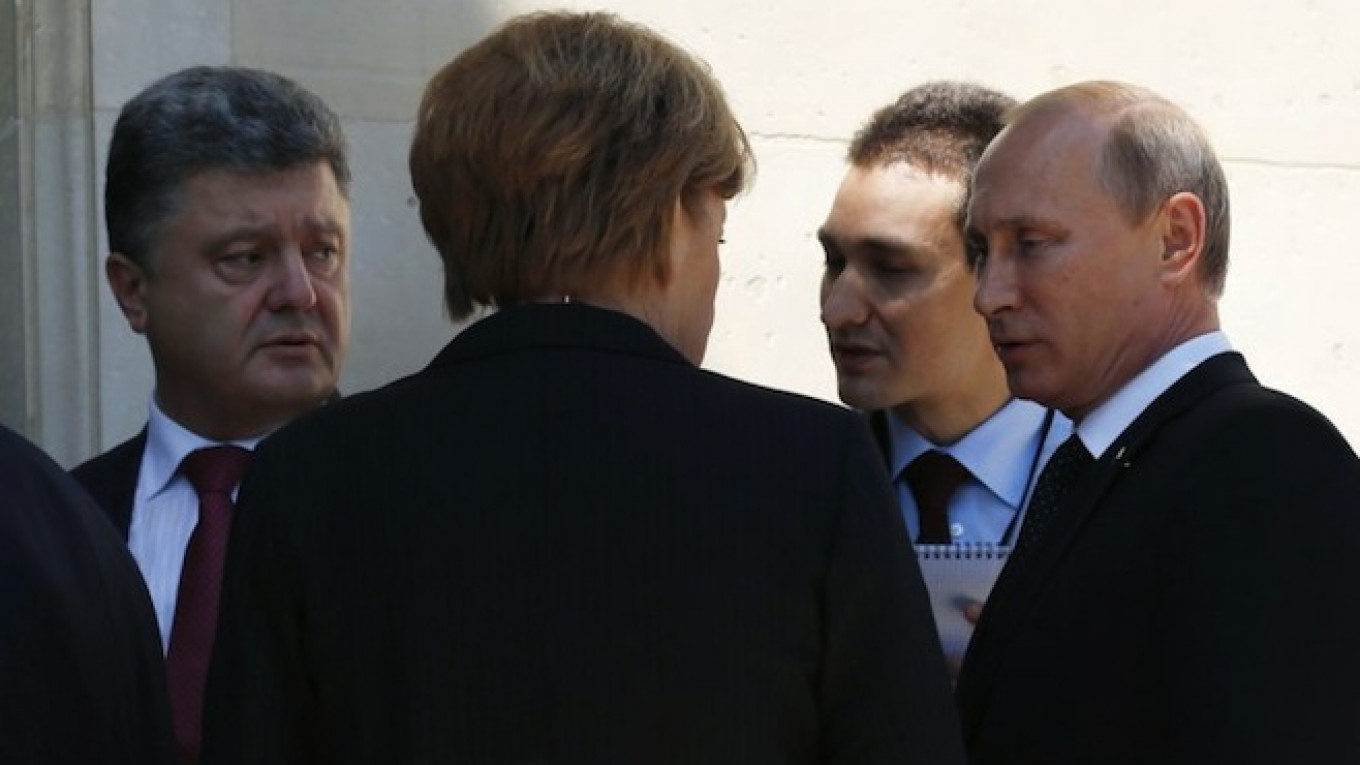BRUSSELS — The presidents of Russia, Ukraine and the European Commission have agreed to hold talks on disputes over gas and an EU-Ukraine free-trade agreement, in parallel with efforts to stabilize the security situation in Ukraine, the EU said.
The talks between Russian President Vladimir Putin, Ukrainian President Petro Poroshenko and European Commission President Jose Manuel Barroso are intended to be held in person, a European Commission source said, but it is not yet clear where or when.
Raising discussions of the disputes to the level of presidents appeared to offer hope of a possible easing of tensions over Ukraine, immersed in a crisis which has sent relations between Russia and the West plummeting.
Barroso spoke to Putin by telephone on Thursday to discuss ways to ease the crisis in Ukraine, the commission said in a statement.
"It was agreed to hold consultations between the presidents of Russia, Ukraine and the European Commission on the issues related with the implementation of the [EU-Ukraine] association agreement as well as on the supply of gas, in parallel with the efforts to stabilize the political and security situation," the statement said.
"The concrete arrangements for these talks will be further discussed through the appropriate diplomatic channels," the commission said.
A series of three-way talks over a gas dispute bringing together the energy ministers of Ukraine and Russia and European Energy Commissioner Guenther Oettinger broke down in June, prompting Gazprom to cut off gas supplies to Ukraine.
Since then, Oettinger has held bilateral talks with Ukraine's energy minister and is scheduled to meet Russia's energy minister on Aug. 29 to try to restart trilateral discussions on resolving Russia's row with Ukraine over how much it pays for its gas.
So far, the disruption of Ukraine's gas supplies has not had an impact on EU consumers, but Ukraine is a transit route for roughly half of the gas Russia ships to the European Union, which relies on Moscow for about a third of its energy.
The EU has also held talks with Russia to try to calm Kremlin fears over a wide-ranging free trade pact that Ukraine has signed with the 28-nation EU which Russia says will be harmful to its economy.
A tug of war between the EU and Russia over Ukraine has contributed to a crisis over the former Soviet republic that worsened when Moscow annexed Ukraine's Crimea region in March.
The EU has imposed sanctions on Russia over its annexation of Crimea and support for pro-Moscow separatists battling government forces in eastern Ukraine. Russia has responded by banning imports of most food from the West.
See also:
A Message from The Moscow Times:
Dear readers,
We are facing unprecedented challenges. Russia's Prosecutor General's Office has designated The Moscow Times as an "undesirable" organization, criminalizing our work and putting our staff at risk of prosecution. This follows our earlier unjust labeling as a "foreign agent."
These actions are direct attempts to silence independent journalism in Russia. The authorities claim our work "discredits the decisions of the Russian leadership." We see things differently: we strive to provide accurate, unbiased reporting on Russia.
We, the journalists of The Moscow Times, refuse to be silenced. But to continue our work, we need your help.
Your support, no matter how small, makes a world of difference. If you can, please support us monthly starting from just $2. It's quick to set up, and every contribution makes a significant impact.
By supporting The Moscow Times, you're defending open, independent journalism in the face of repression. Thank you for standing with us.
Remind me later.


